これは、マルチシリーズのベンチマークマネージドPostgreSQLクラウドソリューションの第2部です。 。パート1では、利用可能なツールの概要を示し、AuroraでAWSベンチマーク手順を使用する理由と使用するPostgreSQLのバージョンについて説明し、Amazon AuroraPostgreSQL10.6を確認しました。
このパートでは、pgbenchとsysbenchがAmazon RDS forPostgreSQL11.1に対して実行されます。この記事の執筆時点で、最新のPostgreSQLバージョンは約1か月前にリリースされた11.2です。
クラウドで現在利用可能なPostgreSQLのバージョンをすばやく確認するために少し一時停止する価値があります:
- Amazon Aurora PostgreSQL 10.6
- Amazon RDS for PostgreSQL 11.1
- Google Cloud SQL for PostgreSQL 9.6
- Microsoft Azure PostgreSQL 10.5
Amazonは、PostgreSQLの最新バージョンを提供することにより、RDS製品で再び勝者になりました。 RDSフォーラムで発表されたように、AWSはPostgreSQL11.1をコミュニティリリースから4か月後の3月13日に利用可能にしました。
環境の設定
環境のセットアップとベンチマークの実行に関連する制約に関するいくつかの注意事項、このシリーズのパート1でより詳細に説明したポイント:
- クラウドプロバイダーのデフォルトのGUC設定に変更はありません。
- pgbenchのAWSパッチが適切に適用されなかったため、接続は最大1,000に制限されています。関連するメモとして、ガイドに記載されているリンクでは入手できなくなったため、このpgsql-hackersの送信からAWSタイミングパッチをダウンロードする必要がありました。
- クライアントインスタンスで拡張ネットワークを有効にする必要があります。
- データベースにはレプリカが含まれていません。
- データベースストレージは暗号化されていません。
- クライアントインスタンスとターゲットインスタンスの両方が同じアベイラビリティーゾーンにあります。
まず、クライアントとデータベースインスタンスを設定します。
- クライアントはオンデマンドのr4.8xlargeEC2インスタンスです:
- vCPU:32(16コアx 2スレッド/コア)
- RAM:244 GiB
- ストレージ:EBS最適化
- ネットワーク:10ギガビット
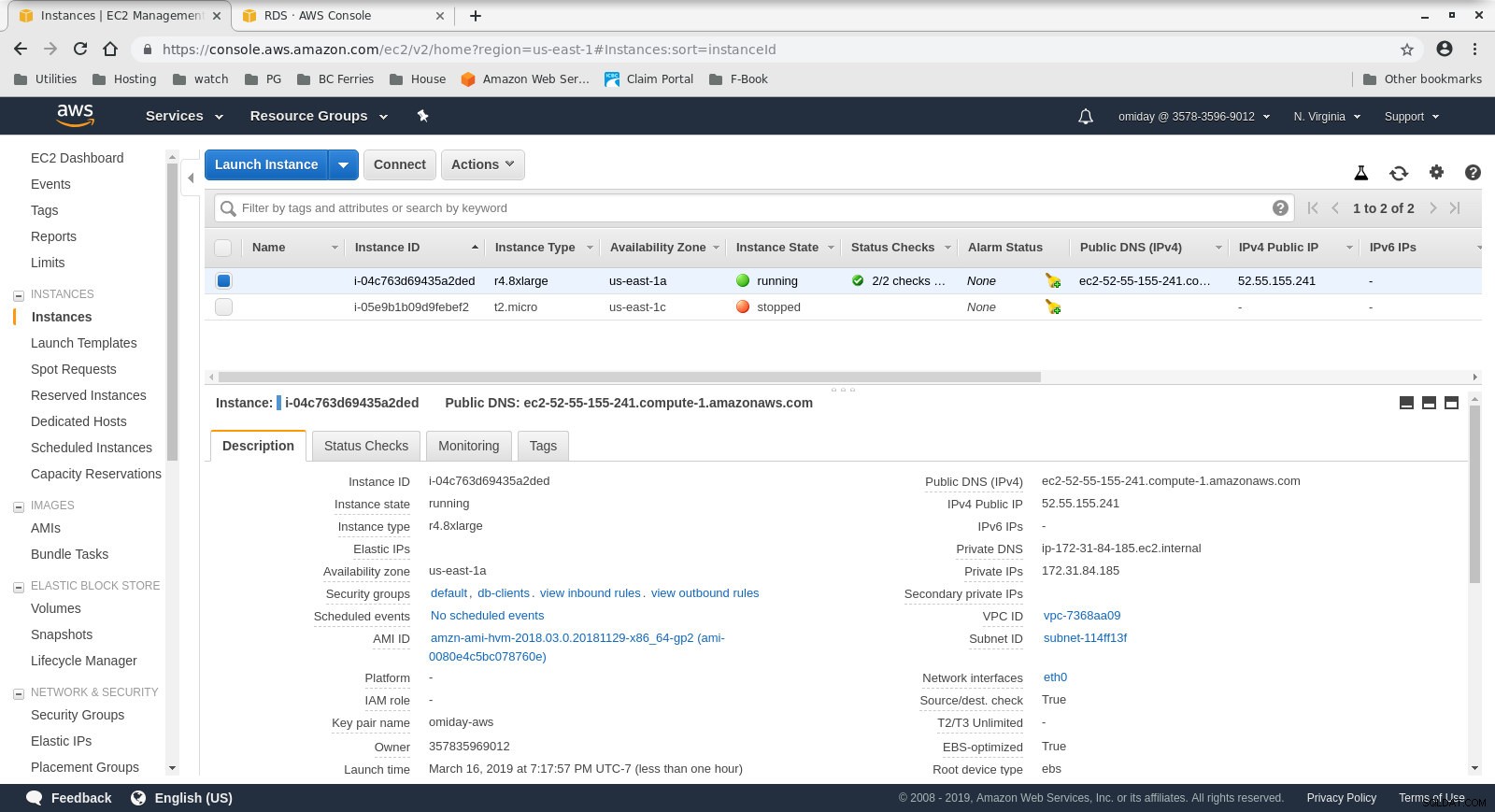 クライアントインスタンスの構成
クライアントインスタンスの構成 - DBクラスターはオンデマンドdb.r4.2xlargeです:
- vCPU:8
- RAM:61GiB
- ストレージ:EBS最適化
- ネットワーク:最大10Gbps接続で最大帯域幅1,750Mbps
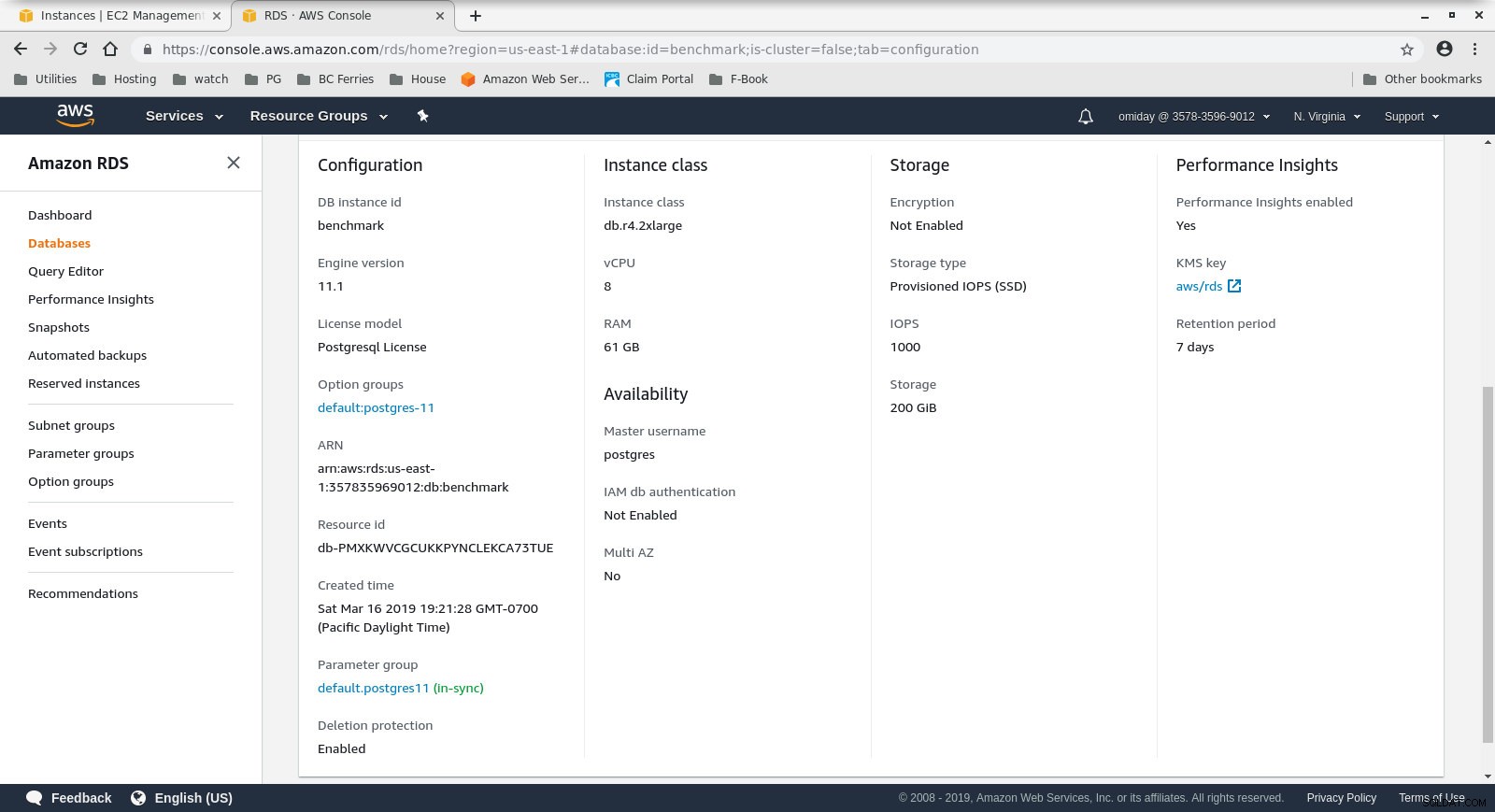 データベースインスタンスの構成
データベースインスタンスの構成
次に、Amazonガイドの手順に従って、ベンチマークツールであるpgbenchとsysbenchをインストールして構成します。
環境を準備する最後のステップは、PostgreSQL接続パラメーターを構成することです。これを行う1つの方法は、.bashrcで環境変数を初期化することです。また、PostgreSQLのバイナリとライブラリへのパスを設定する必要があります:
PGHOST=benchmark.ctfirtyhadgr.us-east-1.rds.amazonaws.comをエクスポート
export PGHOST=benchmark.ctfirtyhadgr.us-east-1.rds.amazonaws.com
export PGUSER=postgres
export PGPASSWORD=postgres
export PGDATABASE=postgres
export PATH=$PATH:/usr/local/pgsql/bin
export LD_LIBRARY_PATH=$LD_LIBRARY_PATH:/usr/local/pgsql/lib
Verify that everything is in place:
[example@sqldat.com ~]# psql --version
psql (PostgreSQL) 11.1
[example@sqldat.com ~]# pgbench --version
pgbench (PostgreSQL) 11.1
[example@sqldat.com ~]# sysbench --version
sysbench 0.5ベンチマークの実行
pgench
まず、pgbenchデータベースを初期化します。
[example@sqldat.com ~]# pgbench -i --fillfactor=90 --scale=10000初期化プロセスには時間がかかり、実行中に次の出力が生成されました:
dropping old tables...
NOTICE: table "pgbench_accounts" does not exist, skipping
NOTICE: table "pgbench_branches" does not exist, skipping
NOTICE: table "pgbench_history" does not exist, skipping
NOTICE: table "pgbench_tellers" does not exist, skipping
creating tables...
generating data...
100000 of 1000000000 tuples (0%) done (elapsed 0.06 s, remaining 599.79 s)
200000 of 1000000000 tuples (0%) done (elapsed 0.15 s, remaining 739.16 s)
300000 of 1000000000 tuples (0%) done (elapsed 0.22 s, remaining 742.21 s)
400000 of 1000000000 tuples (0%) done (elapsed 0.33 s, remaining 814.64 s)
500000 of 1000000000 tuples (0%) done (elapsed 0.41 s, remaining 825.82 s)
600000 of 1000000000 tuples (0%) done (elapsed 0.51 s, remaining 854.13 s)
700000 of 1000000000 tuples (0%) done (elapsed 0.66 s, remaining 937.01 s)
800000 of 1000000000 tuples (0%) done (elapsed 1.52 s, remaining 1897.42 s)
900000 of 1000000000 tuples (0%) done (elapsed 1.66 s, remaining 1840.08 s)
...
500600000 of 1000000000 tuples (50%) done (elapsed 814.78 s, remaining 812.83 s)
500700000 of 1000000000 tuples (50%) done (elapsed 814.81 s, remaining 812.53 s)
500800000 of 1000000000 tuples (50%) done (elapsed 814.83 s, remaining 812.23 s)
500900000 of 1000000000 tuples (50%) done (elapsed 815.11 s, remaining 812.19 s)
501000000 of 1000000000 tuples (50%) done (elapsed 815.20 s, remaining 811.94 s)
...
999200000 of 1000000000 tuples (99%) done (elapsed 1645.02 s, remaining 1.32 s)
999300000 of 1000000000 tuples (99%) done (elapsed 1645.17 s, remaining 1.15 s)
999400000 of 1000000000 tuples (99%) done (elapsed 1645.20 s, remaining 0.99 s)
999500000 of 1000000000 tuples (99%) done (elapsed 1645.23 s, remaining 0.82 s)
999600000 of 1000000000 tuples (99%) done (elapsed 1645.26 s, remaining 0.66 s)
999700000 of 1000000000 tuples (99%) done (elapsed 1645.28 s, remaining 0.49 s)
999800000 of 1000000000 tuples (99%) done (elapsed 1645.51 s, remaining 0.33 s)
999900000 of 1000000000 tuples (99%) done (elapsed 1645.77 s, remaining 0.16 s)
1000000000 of 1000000000 tuples (100%) done (elapsed 1646.03 s, remaining 0.00 s)
vacuuming...
creating primary keys...
total time: 5538.86 s (drop 0.00 s, tables 0.01 s, insert 1647.08 s, commit 0.03 s, primary 1251.60 s, foreign 0.00 s, vacuum 2640.14 s)
done.その部分が完了したら、PostgreSQLデータベースにデータが入力されていることを確認します。次の簡略化されたバージョンのディスク使用量クエリを使用して、PostgreSQLデータベースのサイズを返すことができます。
SELECT
d.datname AS Name,
pg_catalog.pg_get_userbyid(d.datdba) AS Owner,
pg_catalog.pg_size_pretty(pg_catalog.pg_database_size(d.datname)) AS SIZE
FROM pg_catalog.pg_database d
WHERE d.datname = 'postgres';…そして出力:
name | owner | size
----------+----------+--------
postgres | postgres | 160 GB
(1 row)すべての準備が完了したら、読み取り/書き込みpgbenchテストを開始できます。
[example@sqldat.com ~]# pgbench --protocol=prepared -P 60 --time=600 --client=1000 --jobs=204810分後、結果が得られます:
starting vacuum...end.
progress: 60.0 s, 878.3 tps, lat 1101.258 ms stddev 339.491
progress: 120.0 s, 885.2 tps, lat 1132.301 ms stddev 292.551
progress: 180.0 s, 656.3 tps, lat 1522.102 ms stddev 666.017
progress: 240.0 s, 436.8 tps, lat 2277.140 ms stddev 524.603
progress: 300.0 s, 742.2 tps, lat 1363.558 ms stddev 578.541
progress: 360.0 s, 866.4 tps, lat 1146.972 ms stddev 301.861
progress: 420.0 s, 878.2 tps, lat 1143.939 ms stddev 304.396
progress: 480.0 s, 872.7 tps, lat 1139.892 ms stddev 304.421
progress: 540.0 s, 881.0 tps, lat 1132.373 ms stddev 311.890
progress: 600.0 s, 729.3 tps, lat 1366.517 ms stddev 867.784
transaction type: <builtin: TPC-B (sort of)>
scaling factor: 10000
query mode: prepared
number of clients: 1000
number of threads: 1000
duration: 600 s
number of transactions actually processed: 470582
latency average = 1274.340 ms
latency stddev = 544.179 ms
tps = 782.084354 (including connections establishing)
tps = 783.610726 (excluding connections establishing)sysbench
最初のステップは、いくつかのデータを追加することです:
sysbench --test=/usr/local/share/sysbench/oltp.lua \
--pgsql-host=aurora.cluster-ctfirtyhadgr.us-east-1.rds.amazonaws.com \
--pgsql-db=postgres \
--pgsql-user=postgres \
--pgsql-password=postgres \
--pgsql-port=5432 \
--oltp-tables-count=250\
--oltp-table-size=450000 \
prepareこのコマンドは250個のテーブルを作成し、各テーブルには2つのインデックスがあります。
sysbench 0.5: multi-threaded system evaluation benchmark
Creating table 'sbtest1'...
Inserting 450000 records into 'sbtest1'
Creating secondary indexes on 'sbtest1'...
Creating table 'sbtest2'...
...
Creating table 'sbtest250'...
Inserting 450000 records into 'sbtest250'
Creating secondary indexes on 'sbtest250'...インデックスを見てみましょう:
postgres=> \di
List of relations
Schema | Name | Type | Owner | Table
--------+-----------------------+-------+----------+------------------
public | k_1 | index | postgres | sbtest1
public | k_10 | index | postgres | sbtest10
public | k_100 | index | postgres | sbtest100
public | k_101 | index | postgres | sbtest101
public | k_102 | index | postgres | sbtest102
public | k_103 | index | postgres | sbtest103
...
public | k_97 | index | postgres | sbtest97
public | k_98 | index | postgres | sbtest98
public | k_99 | index | postgres | sbtest99
public | pgbench_accounts_pkey | index | postgres | pgbench_accounts
public | pgbench_branches_pkey | index | postgres | pgbench_branches
public | pgbench_tellers_pkey | index | postgres | pgbench_tellers
public | sbtest100_pkey | index | postgres | sbtest100
public | sbtest101_pkey | index | postgres | sbtest101
public | sbtest102_pkey | index | postgres | sbtest102
public | sbtest103_pkey | index | postgres | sbtest103
public | sbtest104_pkey | index | postgres | sbtest104
public | sbtest105_pkey | index | postgres | sbtest105
...
public | sbtest97_pkey | index | postgres | sbtest97
public | sbtest98_pkey | index | postgres | sbtest98
public | sbtest99_pkey | index | postgres | sbtest99
public | sbtest9_pkey | index | postgres | sbtest9
(503 rows)よさそうだ...テストを開始するには、実行するだけです:
sysbench --test=/usr/local/share/sysbench/oltp.lua \
--pgsql-host=aurora.cluster-ctfirtyhadgr.us-east-1.rds.amazonaws.com \
--pgsql-db=postgres \
--pgsql-user=postgres \
--pgsql-password=postgres \
--pgsql-port=5432 \
--oltp-tables-count=250 \
--oltp-table-size=450000 \
--max-requests=0 \
--forced-shutdown \
--report-interval=60 \
--oltp_simple_ranges=0 \
--oltp-distinct-ranges=0 \
--oltp-sum-ranges=0 \
--oltp-order-ranges=0 \
--oltp-point-selects=0 \
--rand-type=uniform \
--max-time=600 \
--num-threads=1000 \
run注意事項:
RDSストレージは「弾力性」がありません。つまり、インスタンスの作成時に割り当てられるストレージスペースは、ベンチマーク中に生成されるデータの量に見合うだけの大きさである必要があります。そうしないと、RDSは次のように失敗します。
FATAL: PQexec() failed: 7 PANIC: could not write to file "pg_wal/xlogtemp.29144": No space left on device
server closed the connection unexpectedly
This probably means the server terminated abnormally
before or while processing the request.
FATAL: failed query: COMMIT
FATAL: failed to execute function `event': 3
WARNING: terminating connection because of crash of another server process
DETAIL: The postmaster has commanded this server process to roll back the current transaction and exit, because another server process exited abnormally and possibly corrupted shared memory.
HINT: In a moment you should be able to reconnect to the database and repeat your command.
WARNING: terminating connection because of crash of another server processデータベースを停止せずにストレージサイズを増やすことはできますが、200GiBから500GiBに拡張するのに約30分かかりました:
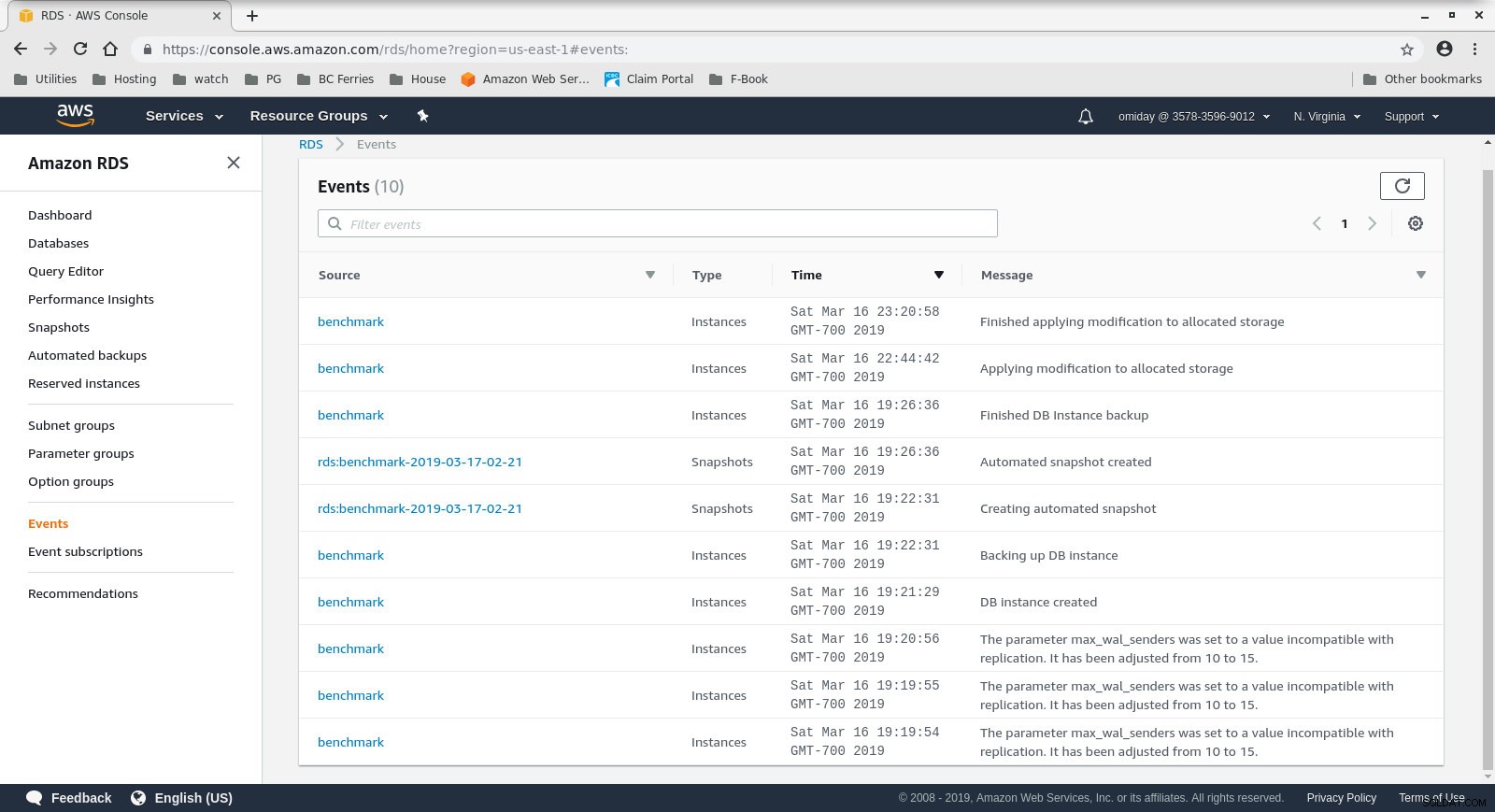 RDSのストレージスペースを増やす
RDSのストレージスペースを増やす そして、これがsysbenchテストの結果です:
sysbench 0.5: multi-threaded system evaluation benchmark
Running the test with following options:
Number of threads: 1000
Report intermediate results every 60 second(s)
Random number generator seed is 0 and will be ignored
Forcing shutdown in 630 seconds
Initializing worker threads...
Threads started!
[ 60s] threads: 1000, tps: 1070.40, reads: 0.00, writes: 4309.35, response time: 1808.81ms (95%), errors: 0.02, reconnects: 0.00
[ 120s] threads: 1000, tps: 889.68, reads: 0.00, writes: 3575.35, response time: 1951.12ms (95%), errors: 0.02, reconnects: 0.00
[ 180s] threads: 1000, tps: 574.57, reads: 0.00, writes: 2320.62, response time: 3936.73ms (95%), errors: 0.00, reconnects: 0.00
[ 240s] threads: 1000, tps: 232.10, reads: 0.00, writes: 928.43, response time: 10994.37ms (95%), errors: 0.00, reconnects: 0.00
[ 300s] threads: 1000, tps: 242.40, reads: 0.00, writes: 969.60, response time: 9412.39ms (95%), errors: 0.00, reconnects: 0.00
[ 360s] threads: 1000, tps: 257.73, reads: 0.00, writes: 1030.98, response time: 8833.64ms (95%), errors: 0.02, reconnects: 0.00
[ 420s] threads: 1000, tps: 264.65, reads: 0.00, writes: 1036.60, response time: 9192.42ms (95%), errors: 0.00, reconnects: 0.00
[ 480s] threads: 1000, tps: 278.07, reads: 0.00, writes: 1134.27, response time: 7133.76ms (95%), errors: 0.00, reconnects: 0.00
[ 540s] threads: 1000, tps: 250.40, reads: 0.00, writes: 1001.53, response time: 9628.97ms (95%), errors: 0.00, reconnects: 0.00
[ 600s] threads: 1000, tps: 249.97, reads: 0.00, writes: 996.92, response time: 10724.58ms (95%), errors: 0.00, reconnects: 0.00
OLTP test statistics:
queries performed:
read: 0
write: 1038401
other: 519199
total: 1557600
transactions: 259598 (428.59 per sec.)
read/write requests: 1038401 (1714.36 per sec.)
other operations: 519199 (857.18 per sec.)
ignored errors: 3 (0.00 per sec.)
reconnects: 0 (0.00 per sec.)
General statistics:
total time: 605.7086s
total number of events: 259598
total time taken by event execution: 602999.7582s
response time:
min: 55.02ms
avg: 2322.82ms
max: 13133.36ms
approx. 95 percentile: 8400.39ms
Threads fairness:
events (avg/stddev): 259.5980/3.20
execution time (avg/stddev): 602.9998/2.77ベンチマークメトリクス
メトリックスは、AWSモニタリングツールCloudWatchおよびPerformanceInsightsを使用してキャプチャできます。ここに好奇心旺盛な人のためのいくつかのサンプルがあります:
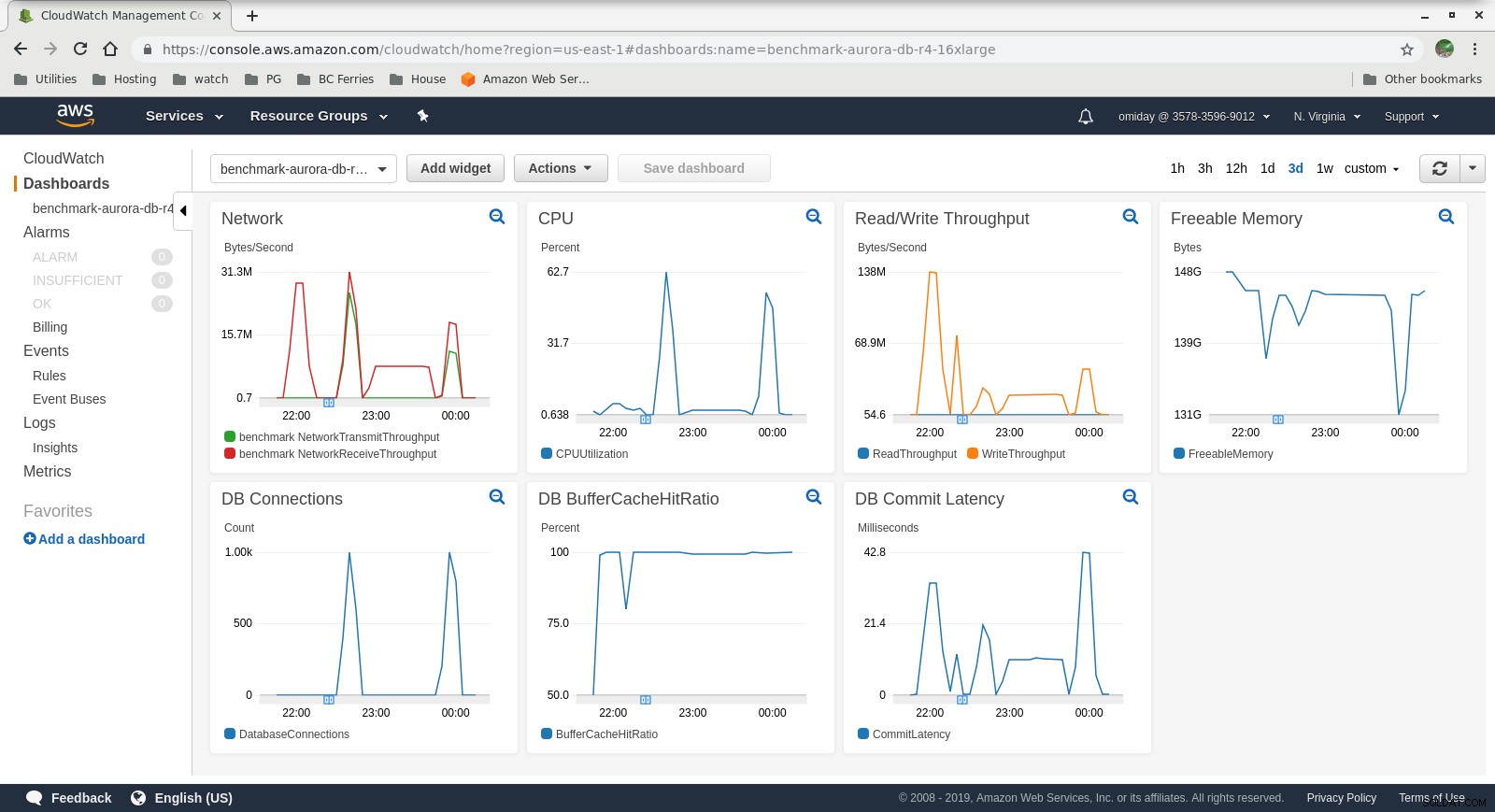 DBインスタンスCloudWatchメトリクス
DBインスタンスCloudWatchメトリクス 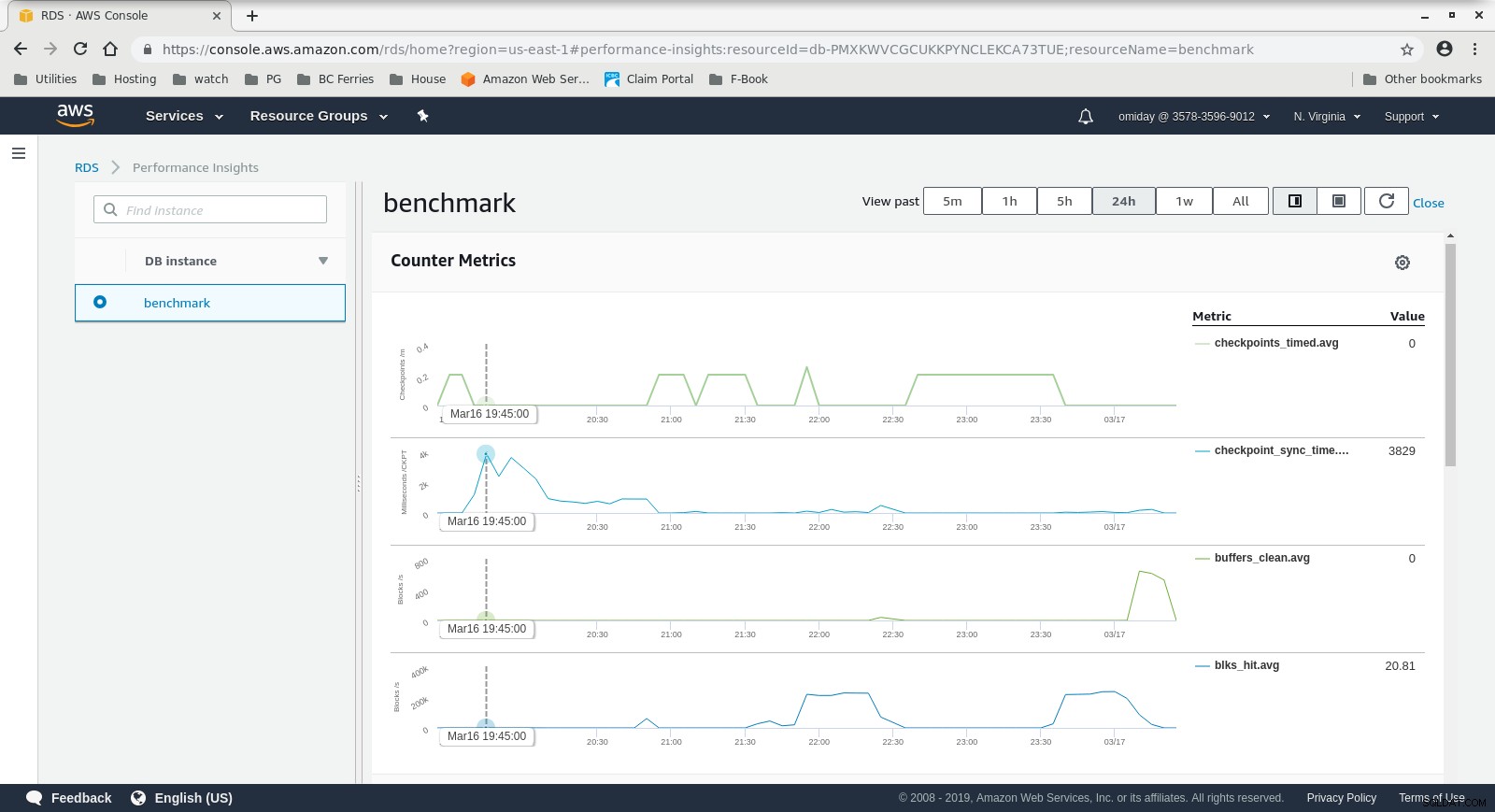 RDSパフォーマンスインサイト-カウンターメトリクス
RDSパフォーマンスインサイト-カウンターメトリクス 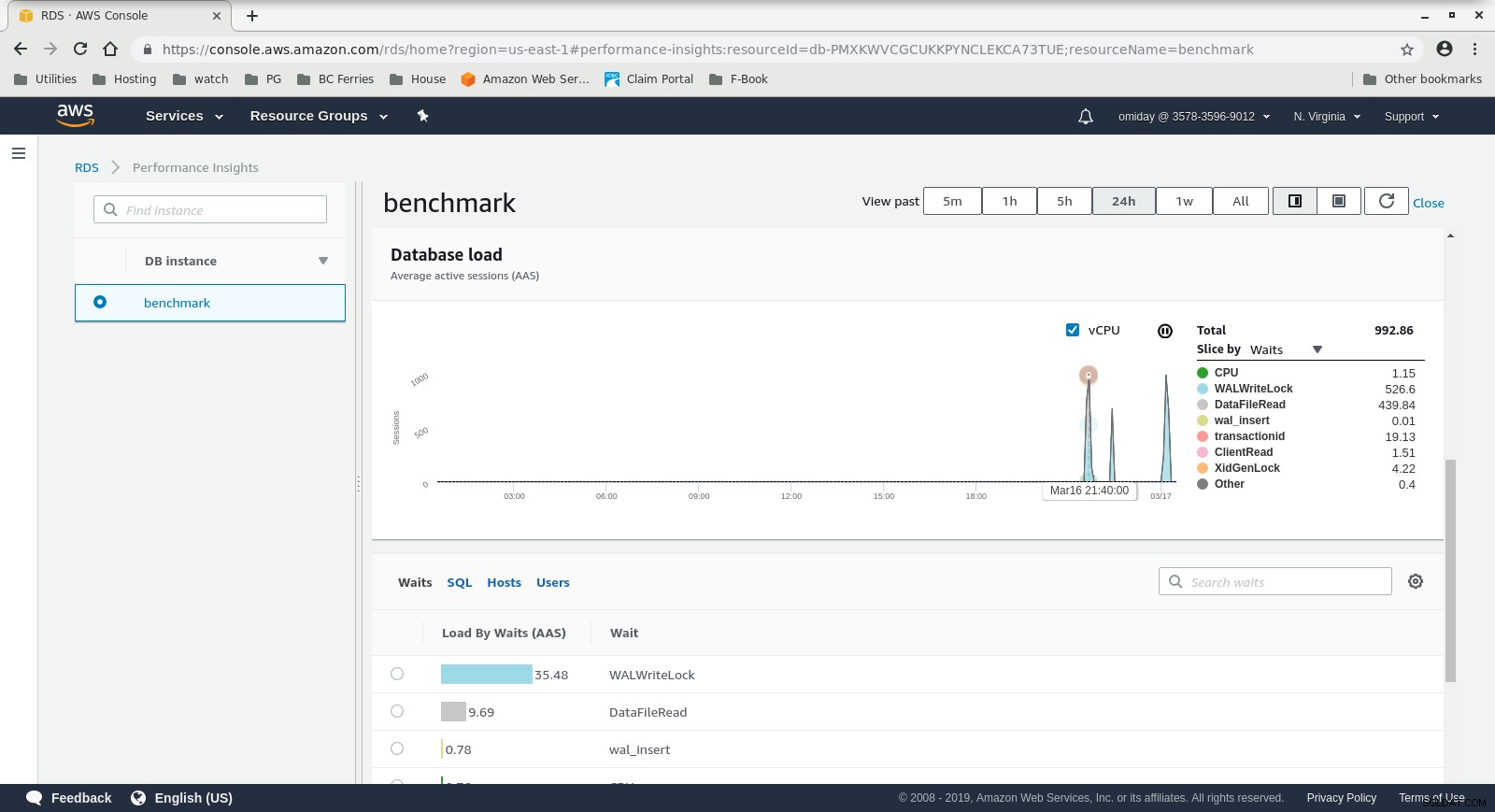 RDSPerformanceInsights-データベースのロード
RDSPerformanceInsights-データベースのロード 結果
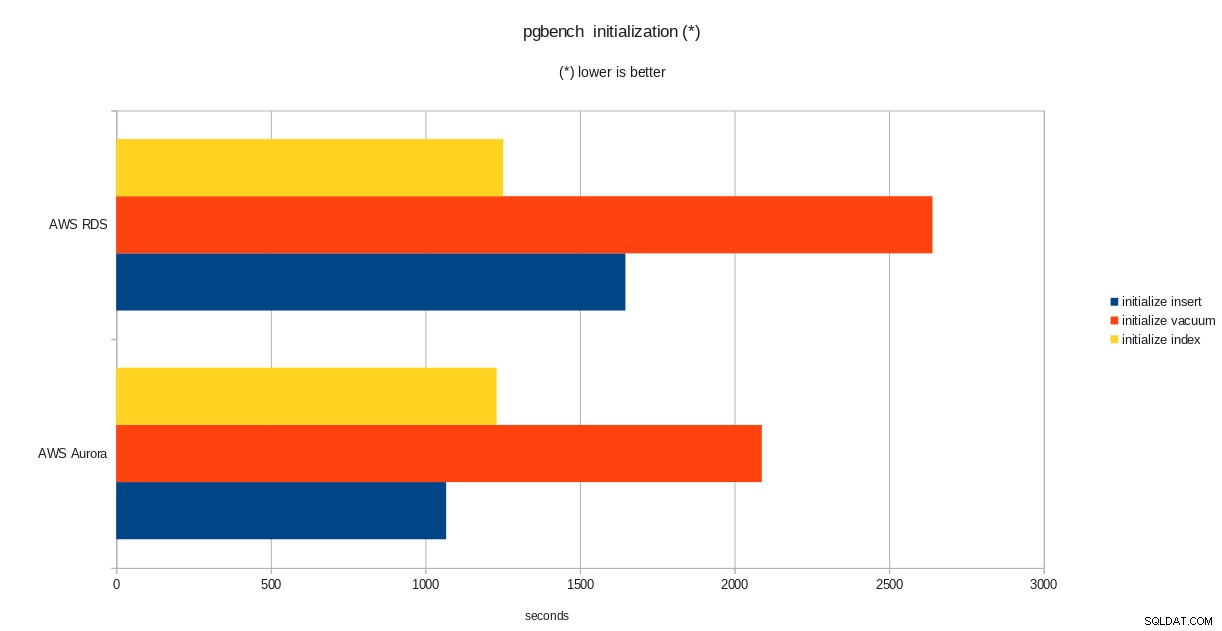 pgbenchの初期化結果
pgbenchの初期化結果 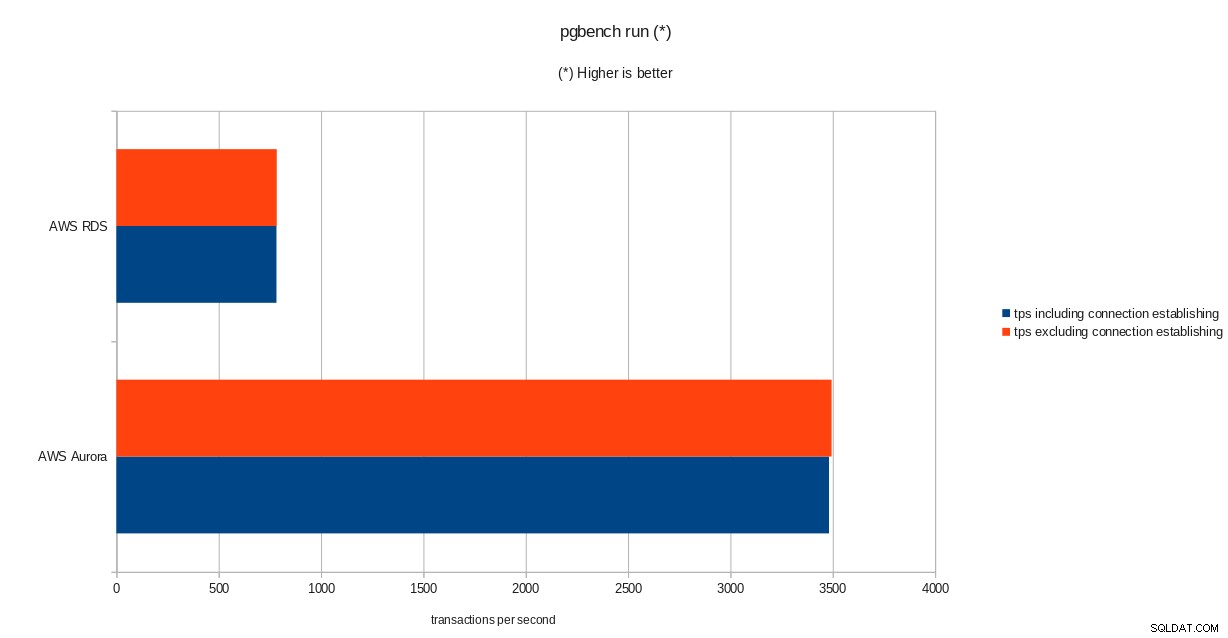 pgbenchの実行結果
pgbenchの実行結果 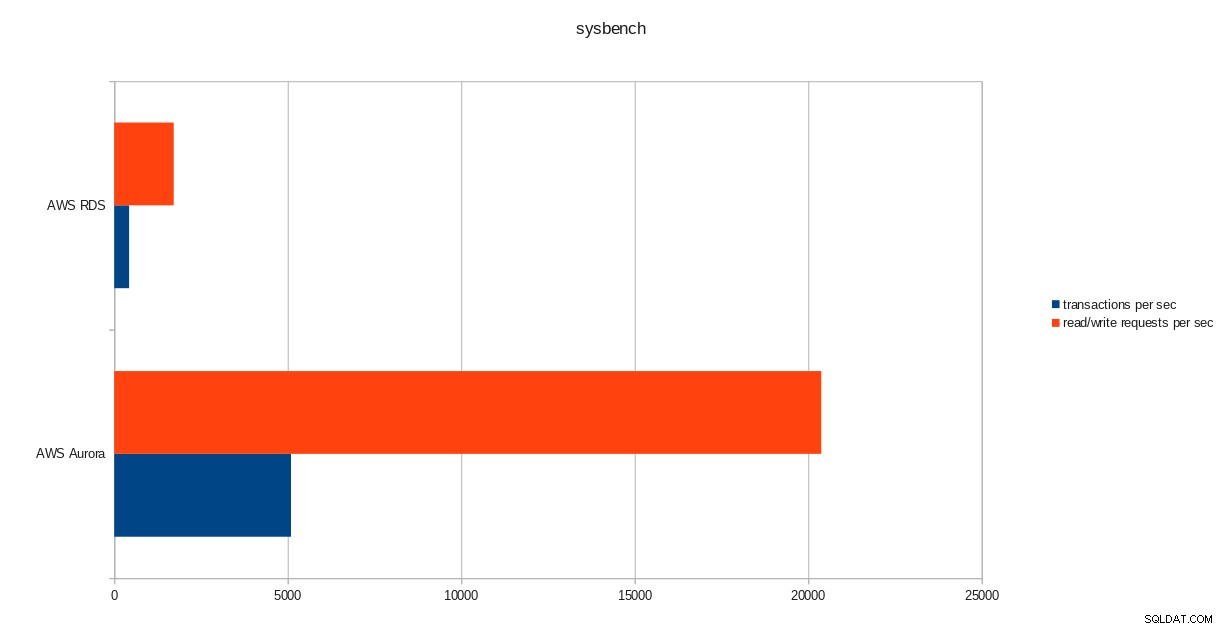 システムベンチの結果
システムベンチの結果 結論
PostgreSQLバージョン10.6を実行しているにもかかわらず、Amazon Auroraはバージョン11.1のRDSを明らかに上回っています。これは、当然のことです。 Aurora FAQによると、Amazonは、再設計されたストレージエンジンの上に構築されたデータベース全体のパフォーマンスを向上させるために、多大な努力を払いました。
次のシリーズ
次のパートでは、Google Cloud SQLforPostgreSQLについて説明します。
